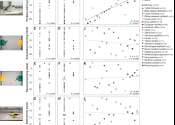Why dancers are better workers, according to research
Breakdancing in the break room might not seem like the best way to get ahead at work, but research shows recreational dance can actually improve productivity performance in the workplace.

Breakdancing in the break room might not seem like the best way to get ahead at work, but research shows recreational dance can actually improve productivity performance in the workplace.
Social Sciences
Jan 17, 2024
0
1

The European starling boasts a remarkable repertoire. Versatile songbirds that learn warbles, whistles, calls, and songs throughout their lives, starlings rank among the most advanced avian vocal learners. Now a new study ...
Plants & Animals
Sep 14, 2023
0
73

Dogs who slow down physically also slow down mentally, according to a new study from North Carolina State University. Measuring gait speed in senior dogs could be a simple way to monitor their health and to document decline ...
Veterinary medicine
Jun 27, 2023
0
30

At school or in everyday life, proportional reasoning is essential for many activities. This type of reasoning allows us to adapt the quantity of ingredients in a recipe or to calculate the distance traveled as a function ...
Mathematics
Nov 29, 2022
0
21

Since 2008, Australia has spent more than A$11 billion dollars over ten years to expand government-funded preschool (or kinder in Victoria) for four-year-olds to better prepare children for school.
Social Sciences
Nov 16, 2022
0
1

A study has found that Eurasian jays can pass a version of the 'marshmallow test'—and those with the greatest self-control also score the highest on intelligence tests.
Plants & Animals
Oct 31, 2022
5
493

Some of the assessment tools that measure children's thinking skills in the U.S. may have provided inaccurate information about poor, urban students because they are modeled on wealthier—mostly white—populations.
Education
Oct 11, 2022
4
33

Reading to little ones builds bonds with their caregivers and boosts their language and literacy skills, but story time also benefits older kids, a new study reports.
Education
May 31, 2022
0
32

Guaranteeing every child the opportunity to participate in certain types of physical activity could support their academic attainment and help to close the achievement gap between wealthy and less-advantaged pupils, new research ...
Education
May 19, 2021
5
172

Crows can voluntarily control the release and onset of their calls, suggesting that songbird vocalizations are under cognitive control, according to a study published August 27 in the open-access journal PLOS Biology by Katharina ...
Plants & Animals
Aug 27, 2019
0
1476
The executive system is a theorized cognitive system in psychology that controls and manages other cognitive processes. It is also referred to as the executive function, executive functions, supervisory attentional system, or cognitive control.
The concept is used by psychologists and neuroscientists to describe a loosely defined collection of brain processes which are responsible for planning, cognitive flexibility, abstract thinking, rule acquisition, initiating appropriate actions and inhibiting inappropriate actions, and selecting relevant sensory information.[citations needed]
This text uses material from Wikipedia, licensed under CC BY-SA